新概念第二册Lesson 1 A private conversation课件(共37张PPT)
文档属性
| 名称 | 新概念第二册Lesson 1 A private conversation课件(共37张PPT) | 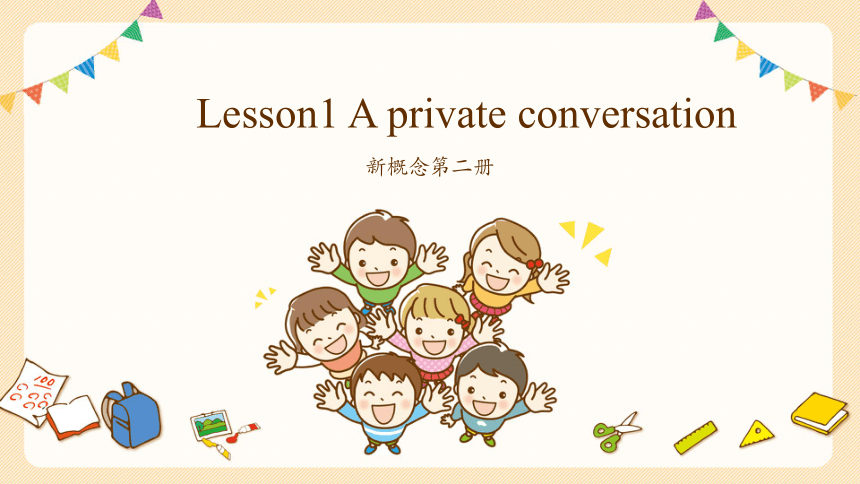 | |
| 格式 | pptx | ||
| 文件大小 | 26.8MB | ||
| 资源类型 | 教案 | ||
| 版本资源 | 新概念英语 | ||
| 科目 | 英语 | ||
| 更新时间 | 2025-01-03 11:46:40 | ||
图片预览


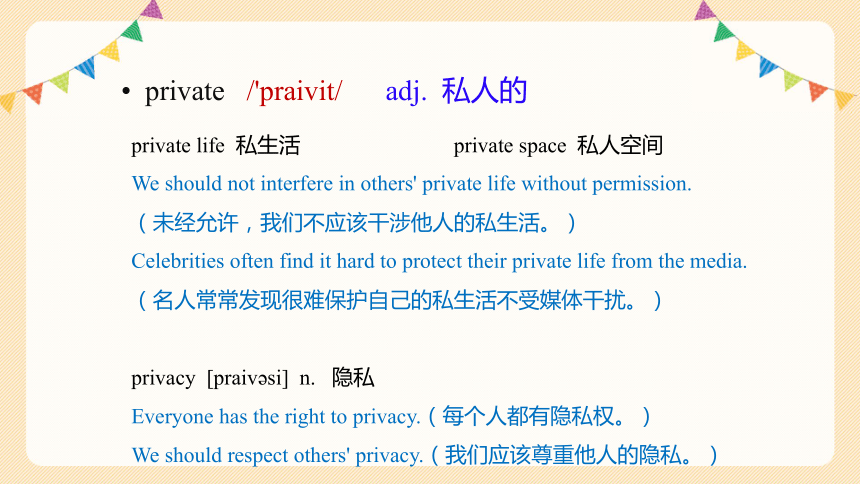
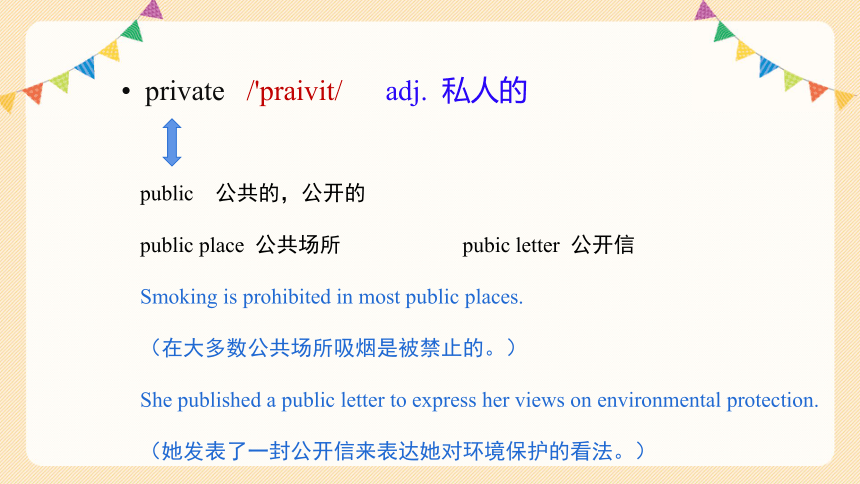
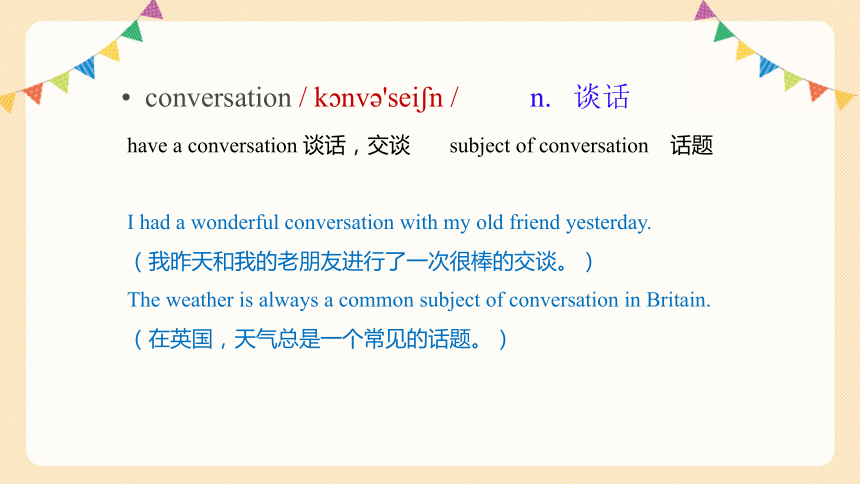
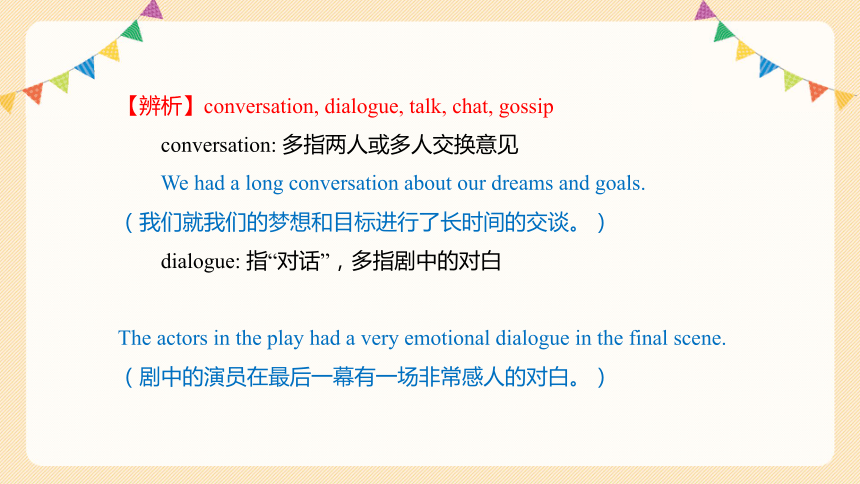

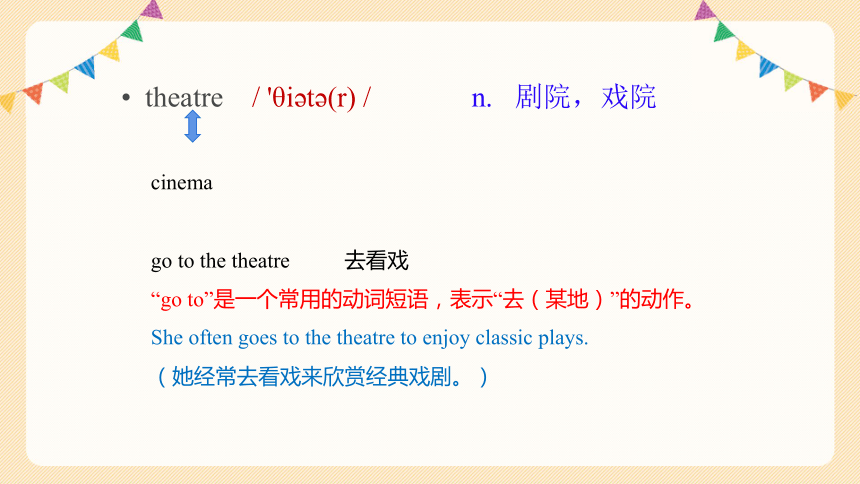


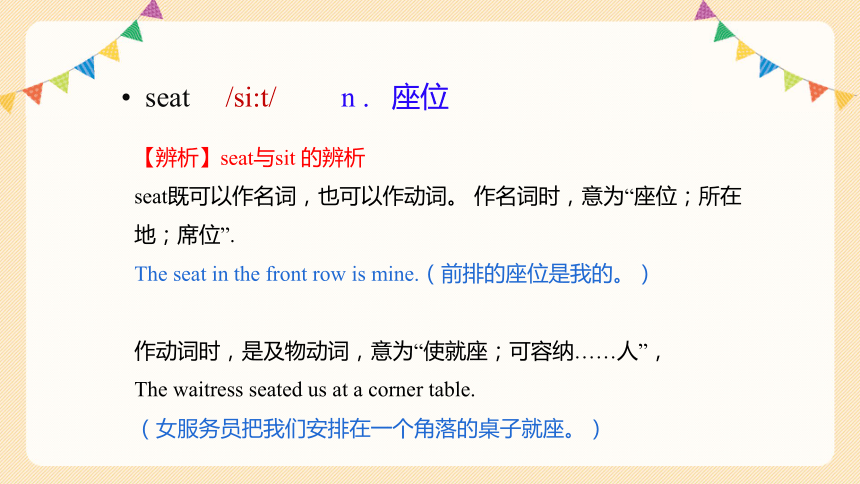
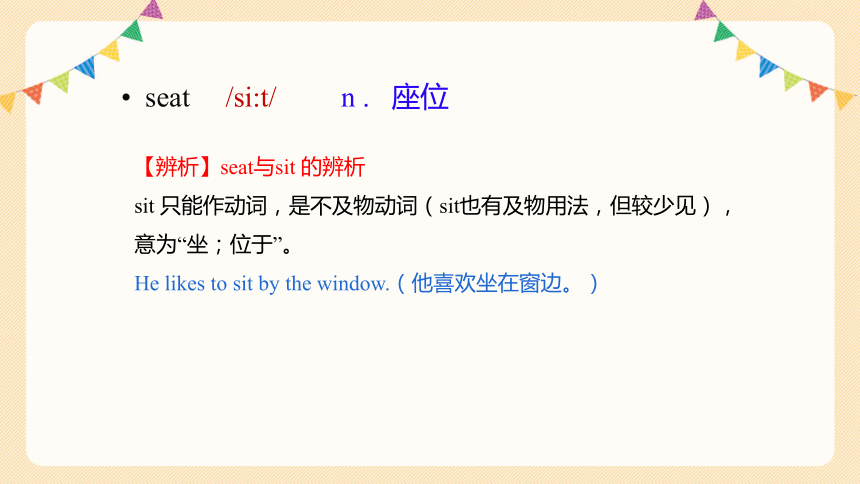
文档简介
(共37张PPT)
Lesson1 A private conversation
新概念第二册
Vocabulary
private /'praivit/ adj. 私人的
private life 私生活 private space 私人空间
We should not interfere in others' private life without permission.
(未经允许,我们不应该干涉他人的私生活。)
Celebrities often find it hard to protect their private life from the media.(名人常常发现很难保护自己的私生活不受媒体干扰。)
privacy [praiv si] n. 隐私
Everyone has the right to privacy.(每个人都有隐私权。)
We should respect others' privacy.(我们应该尊重他人的隐私。)
private /'praivit/ adj. 私人的
public 公共的,公开的
public place 公共场所 pubic letter 公开信
Smoking is prohibited in most public places.
(在大多数公共场所吸烟是被禁止的。)
She published a public letter to express her views on environmental protection.
(她发表了一封公开信来表达她对环境保护的看法。)
conversation / k nv 'sei n / n. 谈话
have a conversation 谈话,交谈 subject of conversation 话题
I had a wonderful conversation with my old friend yesterday.
(我昨天和我的老朋友进行了一次很棒的交谈。)
The weather is always a common subject of conversation in Britain.(在英国,天气总是一个常见的话题。)
【辨析】conversation, dialogue, talk, chat, gossip
conversation: 多指两人或多人交换意见
We had a long conversation about our dreams and goals.
(我们就我们的梦想和目标进行了长时间的交谈。)
dialogue: 指“对话”,多指剧中的对白
The actors in the play had a very emotional dialogue in the final scene.(剧中的演员在最后一幕有一场非常感人的对白。)
talk: 可与conversation换用,但复数talks指正式会谈
Let's have a talk about this problem.(让我们来谈谈这个问题。)
chat: 闲谈,chat online
We often chat in the park on weekends.(我们经常在周末在公园闲谈。)
gossip: 闲谈,八卦
The women in the neighborhood like to gossip about the new family in the street.(街区里的女人们喜欢八卦街上新来的家庭。)
theatre / 'θi t (r) / n. 剧院,戏院
cinema
go to the theatre 去看戏
“go to”是一个常用的动词短语,表示“去(某地)”的动作。
She often goes to the theatre to enjoy classic plays.
(她经常去看戏来欣赏经典戏剧。)
【辨析】cinema与theatre 的辨析
cinema:主要用于播放电影,这些电影是预先录制好的,观众在观看时并不是实时的表演。
We often go to the cinema on weekends to watch the latest movies.
(我们经常在周末去电影院看最新的电影。)
theatre:通常用于现场表演,如戏剧、音乐剧、话剧等,观众可以看到演员在舞台上实时表演 。
She went to the theatre last night and was deeply impressed by the wonderful play.(她昨晚去剧院了,被那出精彩的戏剧深深打动。)
seat /si:t/ n . 座位
① n.座位 have a good seat
take a seat/take your seat 坐下来, 就坐
② vt. 使坐下, 安排...坐下 seat sb.让某人就坐,
Seat yourself.
seat /si:t/ n . 座位
【辨析】seat与sit 的辨析
seat既可以作名词,也可以作动词。 作名词时,意为“座位;所在地;席位”.
The seat in the front row is mine.(前排的座位是我的。)
作动词时,是及物动词,意为“使就座;可容纳……人”,
The waitress seated us at a corner table.
(女服务员把我们安排在一个角落的桌子就座。)
seat /si:t/ n . 座位
【辨析】seat与sit 的辨析
sit 只能作动词,是不及物动词(sit也有及物用法,但较少见),意为“坐;位于”。
He likes to sit by the window.(他喜欢坐在窗边。)
play /plei/ n. 戏,戏剧
movie
【辨析】play与movie 、theatre的辨析
play是指具体的戏剧作品,而theatre既可以指剧院这个场所,也可以指戏剧这个行业或艺术形式.
movie是指电影作品本身,而theatre在美式英语中可指电影院这个场所。We are going to the theatre to see a movie.”(我们要去电影院看电影。)
loudly /'laudli / adv. 大声地
“loud”是形容词,用来修饰名词,而“loudly”是副词,用来修饰动词等。
The loud music made me feel uncomfortable.(这里“loud”修饰“music”,表示吵闹的音乐。)
He played the guitar loudly.(这里“loudly”修饰“played”,表示大声地弹奏。)
形容词变副词的规则:
直接加 -ly 大部分形容词直接在词尾加 -ly就可以变成副词。
quick(形容词) quickly(副词),“He runs quickly.”(他跑得快。)
slow(形容词) slowly(副词),“The car moves slowly.”(汽车缓慢行驶。) real(形容词) really(副词),“I'm really happy.”(我真的很开心。)
以 -y结尾的形容词 变 -y为 -i再加 -ly 如果形容词是以辅音字母 y结尾的,将y变为i,再加 -ly。
happy(形容词) happily(副词),“They live happily.”(他们幸福地生活着。) busy(形容词) busily(副词),“She is busily preparing for the exam.”(她正忙碌地准备考试。)
以 -e结尾的形容词 直接加 -ly 如果形容词是以 -e结尾且e不发音,直接在词尾加 -ly。
例如: wide(形容词) widely(副词)
This news is widely spread.(这个消息被广泛传播。)
nice(形容词) nicely(副词)
The room is nicely decorated.(房间装饰得很好。)
去 -e加 -ly(少数情况) 个别以 -e结尾的形容词,要先去掉 -e再加 -ly。 例如: true(形容词) truly(副词)
I'm truly sorry.(我真的很抱歉。)
特殊情况
同形 有一些形容词和副词同形,不需要做任何变化。
例如: fast(形容词/副词)
He is a fast runner.(他是一个跑得快的人。)He runs fast.(他跑得很快。)
early(形容词/副词)
It's an early train.(这是一趟早班火车。)He gets up early.”(他起得早。)
不规则变化 有少数形容词变副词是不规则的。
例如: good(形容词) well(副词),
He is a good student.”(他是一个好学生。)
He does well in his studies.”(他学习很好。)
angry /' gri/ adj. 生气的
angrily /' grili / adv. 生气地
be angry with sb. 表示“对某人生气”。
My mother is angry with me because I broke her favorite vase.
(我妈妈因为我打碎了她最喜欢的花瓶而生我的气。)
be angry at/about sth. 表示“对某事生气”。
She was angry at the news she heard just now.
(她对她刚刚听到的消息很生气。)
attention / 'ten n/ n. 注意
pay no attention 不注意
pay little attention 有点注意
pay close attention 密切注意
pay more attention 更多注意
pay attention to sb./sth. 注意人/某事
Teachers always tell students to pay attention to the speaker during a lecture.
(老师们总是告诉学生在讲座期间要注意演讲者。)
business /'biznis/ n. 事
复数为businesses
商业;生意 He has his own business.(他有自己的生意。)
事务;事情 It's none of your business.(这不关你的事。)
企业;公司;营业(不可数或可数)
Many small businesses are struggling during the economic crisis.
(许多小企业在经济危机期间艰难挣扎。)
business /'biznis/ n. 事
do business (with sb.) (与某人)做生意
We do business with companies all over the world.
(我们与世界各地的公司做生意。)
on business 因公;出差。
He is in New York on business.(他在纽约出差。)
business hours 营业时间。
The business hours of this store are from 9 am to 9 pm.
(这家商店的营业时间是从上午9点到晚上9点。)
rudely /'ru:dli / adv. 无理地,粗鲁地
基本词义 表示“无礼地;粗暴地”。
He rudely interrupted my speech.(他无礼地打断了我的演讲。)
She rudely pushed past me in the queue.(她在排队时粗暴地挤过我。)
修饰动词 作为副词,它主要用来修饰动词,强调动作的无礼或粗暴的方式。
The man rudely shouted at the waiter.
(那个男人粗暴地对服务员大喊大叫。)
课文精讲
Last week I went to the theatre.
时间状语+主语+谓语动词+地点状语
一般过去式
She visited her grandparents last weekend.
(她上周末去看望了她的祖父母。)
I lost my keys yesterday.(我昨天丢了我的钥匙。)
【一般过去式的概念】
定义:一般过去式表示过去某个时间里发生的动作或状态,常和表示过去的时间状语连用,如yesterday(昨天)、last week(上周)、an hour ago(一小时前)等。
I played football yesterday.(我昨天踢足球了。)
强调内容:它强调的是过去某个特定时间发生的一次性动作或存在的状态,与现在没有直接关系。
He was a student ten years ago.(十年前他是一名学生。)
一般过去式
【一般过去式的构成】
规则动词 一般情况:在动词原形后加 -ed。
work worked(工作),look looked(看)。
以不发音的 -e结尾的动词:直接加 -d。
live lived(居住),like liked(喜欢)。
以“辅音字母 y”结尾的动词:把y变为i,再加 -ed。
study studied(学习),carry carried(携带)。
重读闭音节且末尾只有一个辅音字母的动词:双写这个辅音字母,再加 -ed。stop stopped(停止),plan planned(计划)。
一般过去式
不规则动词 不规则动词的过去式形式需要特殊记忆。
go went(去),eat ate(吃),see saw(看见)等。
一般过去式
【一般过去式的句式】
肯定句:主语+动词的过去式+其他。
I bought a book yesterday.(我昨天买了一本书。)
否定句 主语+did not(didn't)+动词原形+其他。
He didn't go to school last Monday.(他上周一没去上学。)
疑问句
一般疑问句:Did+主语+动词原形+其他?
Did you see him yesterday (你昨天看见他了吗?)
特殊疑问句:特殊疑问词+did+主语+动词原形+其他?
What did you do last weekend (你上周末做了什么?)
一般过去式
The play was very interesting.
主语+系动词+表语
以ing结尾的 adj. 一般修饰“物”;
以ed结尾的 adj. 一般修饰“人”。
amusing有趣的 amused觉得有趣的
exciting激动人心的 excited令人激动的
boring无聊的 bored 觉得无聊的
I did not enjoy it.
主+谓+宾
① enjoy+名词 She enjoys books.(她喜欢书。)
② enjoy +代词 enjoy oneself==have a good/wonderful time 玩得开心
③ enjoy+doing I enjoy reading books.(我喜欢读书。)
I could not hear the actors.
hear “听到”(强调听到的结果)
listen to “听”(强调听的动作或过程)
I heard a strange noise outside last night.
(昨晚我听到外面有一个奇怪的声音。)
He is listening to music.(他正在听音乐。)
I turned round.
turn round=turn around
turn v.
① 转变方向 turn left/right 左转/右转 turn to sb for help 向某人求助
②翻到 turn to page 12 翻到第12页
③变得(系动词)
When the traffic light turns red, we should stop.(当交通灯变红时,我们应该停下来。)
I got very angry.
主+系+表
get 变得 (系动词)
She gets more beautiful as she grows up.(随着她长大,她变得更漂亮了。)
得到(实义动词)
I got a new book from the library.(我从图书馆得到了一本新书。)
I looked at the man and the woman angrily.
主+谓+宾+状
angrily修饰V. looked at
be angry with sb. 生某人气
He is angry with his friend for breaking his pen.
(他因为他朋友弄坏了他的笔而生朋友的气。)
be angry about sth.因某事生气
He is angry about the pollution in the city.(他因为城市里的污染而生气。)
'It’s none of your business,'the young man said rudely.
none of your business 不关你的事
on business 出差
My father is on business in Shanghai this week.(我父亲这周在上海出差。)
do business 做生意
My uncle does business with many foreign companies.
(我叔叔和很多外国公司做生意。)
6 1 2 3 4 5 6
When Who Which What action Who Which What How Where When?
Last week I Went To the theatre
I Had A very good seat
The play Was Very interesting
I Did not enjoy It
A young man and a young woman Behind me
they Were talking Loudly
感谢聆听
Lesson1 A private conversation
新概念第二册
Vocabulary
private /'praivit/ adj. 私人的
private life 私生活 private space 私人空间
We should not interfere in others' private life without permission.
(未经允许,我们不应该干涉他人的私生活。)
Celebrities often find it hard to protect their private life from the media.(名人常常发现很难保护自己的私生活不受媒体干扰。)
privacy [praiv si] n. 隐私
Everyone has the right to privacy.(每个人都有隐私权。)
We should respect others' privacy.(我们应该尊重他人的隐私。)
private /'praivit/ adj. 私人的
public 公共的,公开的
public place 公共场所 pubic letter 公开信
Smoking is prohibited in most public places.
(在大多数公共场所吸烟是被禁止的。)
She published a public letter to express her views on environmental protection.
(她发表了一封公开信来表达她对环境保护的看法。)
conversation / k nv 'sei n / n. 谈话
have a conversation 谈话,交谈 subject of conversation 话题
I had a wonderful conversation with my old friend yesterday.
(我昨天和我的老朋友进行了一次很棒的交谈。)
The weather is always a common subject of conversation in Britain.(在英国,天气总是一个常见的话题。)
【辨析】conversation, dialogue, talk, chat, gossip
conversation: 多指两人或多人交换意见
We had a long conversation about our dreams and goals.
(我们就我们的梦想和目标进行了长时间的交谈。)
dialogue: 指“对话”,多指剧中的对白
The actors in the play had a very emotional dialogue in the final scene.(剧中的演员在最后一幕有一场非常感人的对白。)
talk: 可与conversation换用,但复数talks指正式会谈
Let's have a talk about this problem.(让我们来谈谈这个问题。)
chat: 闲谈,chat online
We often chat in the park on weekends.(我们经常在周末在公园闲谈。)
gossip: 闲谈,八卦
The women in the neighborhood like to gossip about the new family in the street.(街区里的女人们喜欢八卦街上新来的家庭。)
theatre / 'θi t (r) / n. 剧院,戏院
cinema
go to the theatre 去看戏
“go to”是一个常用的动词短语,表示“去(某地)”的动作。
She often goes to the theatre to enjoy classic plays.
(她经常去看戏来欣赏经典戏剧。)
【辨析】cinema与theatre 的辨析
cinema:主要用于播放电影,这些电影是预先录制好的,观众在观看时并不是实时的表演。
We often go to the cinema on weekends to watch the latest movies.
(我们经常在周末去电影院看最新的电影。)
theatre:通常用于现场表演,如戏剧、音乐剧、话剧等,观众可以看到演员在舞台上实时表演 。
She went to the theatre last night and was deeply impressed by the wonderful play.(她昨晚去剧院了,被那出精彩的戏剧深深打动。)
seat /si:t/ n . 座位
① n.座位 have a good seat
take a seat/take your seat 坐下来, 就坐
② vt. 使坐下, 安排...坐下 seat sb.让某人就坐,
Seat yourself.
seat /si:t/ n . 座位
【辨析】seat与sit 的辨析
seat既可以作名词,也可以作动词。 作名词时,意为“座位;所在地;席位”.
The seat in the front row is mine.(前排的座位是我的。)
作动词时,是及物动词,意为“使就座;可容纳……人”,
The waitress seated us at a corner table.
(女服务员把我们安排在一个角落的桌子就座。)
seat /si:t/ n . 座位
【辨析】seat与sit 的辨析
sit 只能作动词,是不及物动词(sit也有及物用法,但较少见),意为“坐;位于”。
He likes to sit by the window.(他喜欢坐在窗边。)
play /plei/ n. 戏,戏剧
movie
【辨析】play与movie 、theatre的辨析
play是指具体的戏剧作品,而theatre既可以指剧院这个场所,也可以指戏剧这个行业或艺术形式.
movie是指电影作品本身,而theatre在美式英语中可指电影院这个场所。We are going to the theatre to see a movie.”(我们要去电影院看电影。)
loudly /'laudli / adv. 大声地
“loud”是形容词,用来修饰名词,而“loudly”是副词,用来修饰动词等。
The loud music made me feel uncomfortable.(这里“loud”修饰“music”,表示吵闹的音乐。)
He played the guitar loudly.(这里“loudly”修饰“played”,表示大声地弹奏。)
形容词变副词的规则:
直接加 -ly 大部分形容词直接在词尾加 -ly就可以变成副词。
quick(形容词) quickly(副词),“He runs quickly.”(他跑得快。)
slow(形容词) slowly(副词),“The car moves slowly.”(汽车缓慢行驶。) real(形容词) really(副词),“I'm really happy.”(我真的很开心。)
以 -y结尾的形容词 变 -y为 -i再加 -ly 如果形容词是以辅音字母 y结尾的,将y变为i,再加 -ly。
happy(形容词) happily(副词),“They live happily.”(他们幸福地生活着。) busy(形容词) busily(副词),“She is busily preparing for the exam.”(她正忙碌地准备考试。)
以 -e结尾的形容词 直接加 -ly 如果形容词是以 -e结尾且e不发音,直接在词尾加 -ly。
例如: wide(形容词) widely(副词)
This news is widely spread.(这个消息被广泛传播。)
nice(形容词) nicely(副词)
The room is nicely decorated.(房间装饰得很好。)
去 -e加 -ly(少数情况) 个别以 -e结尾的形容词,要先去掉 -e再加 -ly。 例如: true(形容词) truly(副词)
I'm truly sorry.(我真的很抱歉。)
特殊情况
同形 有一些形容词和副词同形,不需要做任何变化。
例如: fast(形容词/副词)
He is a fast runner.(他是一个跑得快的人。)He runs fast.(他跑得很快。)
early(形容词/副词)
It's an early train.(这是一趟早班火车。)He gets up early.”(他起得早。)
不规则变化 有少数形容词变副词是不规则的。
例如: good(形容词) well(副词),
He is a good student.”(他是一个好学生。)
He does well in his studies.”(他学习很好。)
angry /' gri/ adj. 生气的
angrily /' grili / adv. 生气地
be angry with sb. 表示“对某人生气”。
My mother is angry with me because I broke her favorite vase.
(我妈妈因为我打碎了她最喜欢的花瓶而生我的气。)
be angry at/about sth. 表示“对某事生气”。
She was angry at the news she heard just now.
(她对她刚刚听到的消息很生气。)
attention / 'ten n/ n. 注意
pay no attention 不注意
pay little attention 有点注意
pay close attention 密切注意
pay more attention 更多注意
pay attention to sb./sth. 注意人/某事
Teachers always tell students to pay attention to the speaker during a lecture.
(老师们总是告诉学生在讲座期间要注意演讲者。)
business /'biznis/ n. 事
复数为businesses
商业;生意 He has his own business.(他有自己的生意。)
事务;事情 It's none of your business.(这不关你的事。)
企业;公司;营业(不可数或可数)
Many small businesses are struggling during the economic crisis.
(许多小企业在经济危机期间艰难挣扎。)
business /'biznis/ n. 事
do business (with sb.) (与某人)做生意
We do business with companies all over the world.
(我们与世界各地的公司做生意。)
on business 因公;出差。
He is in New York on business.(他在纽约出差。)
business hours 营业时间。
The business hours of this store are from 9 am to 9 pm.
(这家商店的营业时间是从上午9点到晚上9点。)
rudely /'ru:dli / adv. 无理地,粗鲁地
基本词义 表示“无礼地;粗暴地”。
He rudely interrupted my speech.(他无礼地打断了我的演讲。)
She rudely pushed past me in the queue.(她在排队时粗暴地挤过我。)
修饰动词 作为副词,它主要用来修饰动词,强调动作的无礼或粗暴的方式。
The man rudely shouted at the waiter.
(那个男人粗暴地对服务员大喊大叫。)
课文精讲
Last week I went to the theatre.
时间状语+主语+谓语动词+地点状语
一般过去式
She visited her grandparents last weekend.
(她上周末去看望了她的祖父母。)
I lost my keys yesterday.(我昨天丢了我的钥匙。)
【一般过去式的概念】
定义:一般过去式表示过去某个时间里发生的动作或状态,常和表示过去的时间状语连用,如yesterday(昨天)、last week(上周)、an hour ago(一小时前)等。
I played football yesterday.(我昨天踢足球了。)
强调内容:它强调的是过去某个特定时间发生的一次性动作或存在的状态,与现在没有直接关系。
He was a student ten years ago.(十年前他是一名学生。)
一般过去式
【一般过去式的构成】
规则动词 一般情况:在动词原形后加 -ed。
work worked(工作),look looked(看)。
以不发音的 -e结尾的动词:直接加 -d。
live lived(居住),like liked(喜欢)。
以“辅音字母 y”结尾的动词:把y变为i,再加 -ed。
study studied(学习),carry carried(携带)。
重读闭音节且末尾只有一个辅音字母的动词:双写这个辅音字母,再加 -ed。stop stopped(停止),plan planned(计划)。
一般过去式
不规则动词 不规则动词的过去式形式需要特殊记忆。
go went(去),eat ate(吃),see saw(看见)等。
一般过去式
【一般过去式的句式】
肯定句:主语+动词的过去式+其他。
I bought a book yesterday.(我昨天买了一本书。)
否定句 主语+did not(didn't)+动词原形+其他。
He didn't go to school last Monday.(他上周一没去上学。)
疑问句
一般疑问句:Did+主语+动词原形+其他?
Did you see him yesterday (你昨天看见他了吗?)
特殊疑问句:特殊疑问词+did+主语+动词原形+其他?
What did you do last weekend (你上周末做了什么?)
一般过去式
The play was very interesting.
主语+系动词+表语
以ing结尾的 adj. 一般修饰“物”;
以ed结尾的 adj. 一般修饰“人”。
amusing有趣的 amused觉得有趣的
exciting激动人心的 excited令人激动的
boring无聊的 bored 觉得无聊的
I did not enjoy it.
主+谓+宾
① enjoy+名词 She enjoys books.(她喜欢书。)
② enjoy +代词 enjoy oneself==have a good/wonderful time 玩得开心
③ enjoy+doing I enjoy reading books.(我喜欢读书。)
I could not hear the actors.
hear “听到”(强调听到的结果)
listen to “听”(强调听的动作或过程)
I heard a strange noise outside last night.
(昨晚我听到外面有一个奇怪的声音。)
He is listening to music.(他正在听音乐。)
I turned round.
turn round=turn around
turn v.
① 转变方向 turn left/right 左转/右转 turn to sb for help 向某人求助
②翻到 turn to page 12 翻到第12页
③变得(系动词)
When the traffic light turns red, we should stop.(当交通灯变红时,我们应该停下来。)
I got very angry.
主+系+表
get 变得 (系动词)
She gets more beautiful as she grows up.(随着她长大,她变得更漂亮了。)
得到(实义动词)
I got a new book from the library.(我从图书馆得到了一本新书。)
I looked at the man and the woman angrily.
主+谓+宾+状
angrily修饰V. looked at
be angry with sb. 生某人气
He is angry with his friend for breaking his pen.
(他因为他朋友弄坏了他的笔而生朋友的气。)
be angry about sth.因某事生气
He is angry about the pollution in the city.(他因为城市里的污染而生气。)
'It’s none of your business,'the young man said rudely.
none of your business 不关你的事
on business 出差
My father is on business in Shanghai this week.(我父亲这周在上海出差。)
do business 做生意
My uncle does business with many foreign companies.
(我叔叔和很多外国公司做生意。)
6 1 2 3 4 5 6
When Who Which What action Who Which What How Where When?
Last week I Went To the theatre
I Had A very good seat
The play Was Very interesting
I Did not enjoy It
A young man and a young woman Behind me
they Were talking Loudly
感谢聆听
同课章节目录
